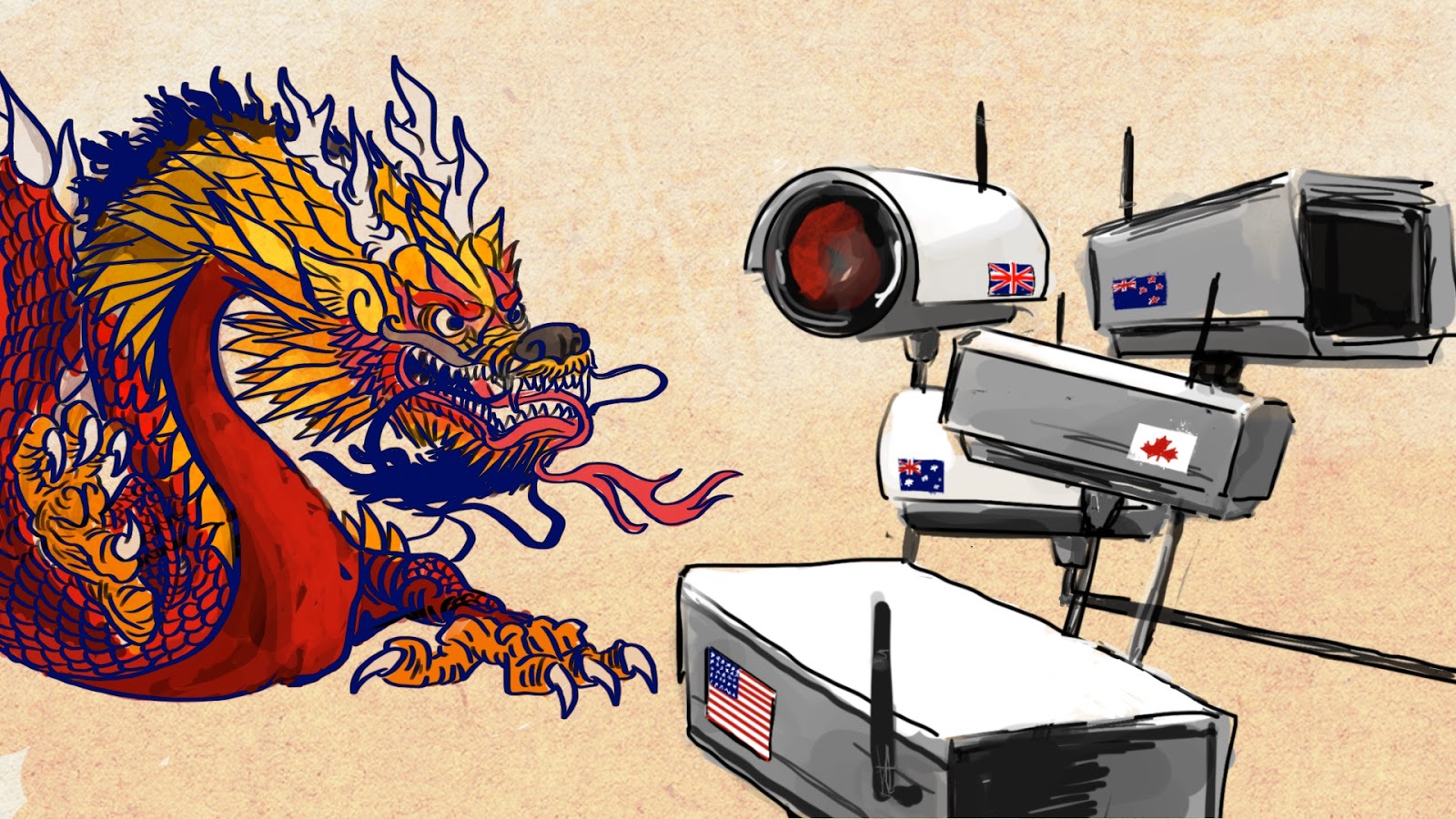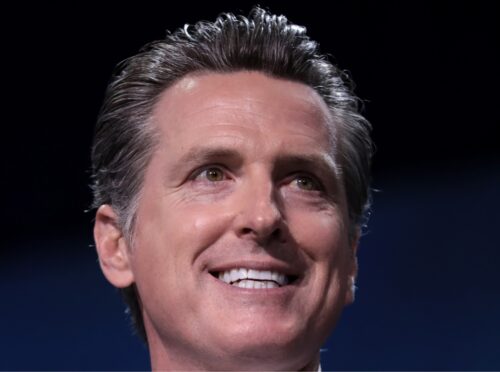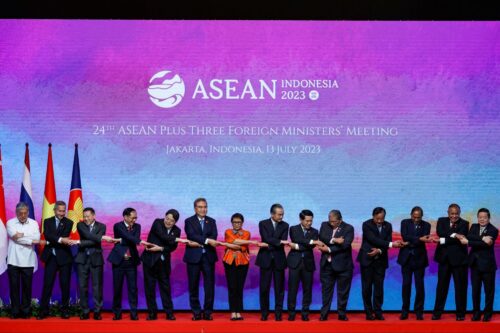Will New Zealand become more hawkish toward China?
New Zealand's relationship with China since the mid-2000s has been characterized first and foremost as an economic opportunity. But with China’s relations with New Zealand’s allies deteriorating, is Wellington ready to take a more assertive stance?

China’s relationships with the major countries in the Five Eyes intelligence sharing partnership has markedly deteriorated since 2016. The U.S., Canada, Australia, and the U.K. have been embroiled in trade disputes, battles over whether Huawei should be allowed to build 5G networks, and diplomatic jostling over Hong Kong. Following the Australian government’s call for an investigation into the origins of COVID-19, its relationship with China hit a new low in November when China announced tariffs of up to 212% on imported Australian wine. Yet there is one remaining Five Eyes country that has, so far, avoided a difficult reckoning of its relationship with China: New Zealand.
New Zealand’s apparent decision not to adopt the more hawkish stances of the other Five Eyes members has not gone unnoticed. Articles on New Zealand’s relationship with China and the Five Eyes will frequently note that the country has been labeled the “soft underbelly” of the network due to its alleged failure to take Chinese interference in its domestic affairs seriously, something that has reportedly inflamed those in the intelligence sector in other Five Eyes countries. When the U.S., U.K., Canada, and Australia issued a joint statement on the Hong Kong national security law, U.S.-based China commentator Bill Bishop was quick to point out New Zealand’s absence. New Zealand, instead, opted to issue its own statement.
New Zealand’s relationship with China has often been depicted effusively by both sides, with frequent championing of what has come to be known as the five diplomatic “firsts,” the most notable of which is perhaps New Zealand’s status as the first Western country to enter into a free trade agreement with China.
Anne-Marie Brady, a New Zealand academic, has been the most public proponent of New Zealand’s ongoing need to take so-called Chinese interference seriously. In a recent Diplomat article, Brady argues that New Zealand has in fact been undergoing a “quiet recalibration” of its relationship with China since 2017. According to Brady, New Zealand has been practicing “deliberate ambiguity in its China policy”, even if it has “strenuously avoided confronting China directly.” When New Zealand has taken issue with China, Brady argues that it has strategically done so in a way that appears “country agnostic,” and offers as an example the New Zealand Parliament’s 2018 to 2019 investigation into foreign interference, which Brady asserts was clearly centered on China — though this was deliberately never directly acknowledged.
Rather than lashing out at China, Brady asserts that New Zealand has sought to “boost [its] resilience and resistance” by seeking to strengthen its influence in its corner of the Pacific with the “Pacific Reset” — a foreign policy decision to ramp up cooperation with South Pacific states on issues such as climate change and increase New Zealand’s aid to the region — and to diversify its trade ties through the pursuit of multilateral agreements.
Meanwhile, Australasia-based scholars Anna Powles and Joanne Wallis have also observed a shift in New Zealand’s approach to China. In October, the scholars noted that New Zealand’s then-Minister of Foreign Affairs Winston Peters appeared to be taking a stronger rhetorical stance on China, a move they pointed out was likely to appease and “hearten [New Zealand’s] Australian ally,” which had previously expressed concern about New Zealand’s apparent lack of assertiveness on the China front.
New Zealand has also hammed up its reputation as having an “independent foreign policy” — a reputation the country developed after being suspended from its military alliance with the U.S. and Australia after its decision to ban nuclear-powered and nuclear-armed ships from entering its waters. So far, this strategy appears to have helped New Zealand moderate expectations and navigate its way through the competing demands of both its security and trading partners. At a minimum, it seems to have meant New Zealand has avoided being likened to “a giant kangaroo that serves as the dog of the U.S.,” which is how the Global Times recently described Australia.
But this moderately stronger rhetoric may not be the more overt stance that security partners and some within New Zealand have been calling for. While New Zealand has signed on to joint statements regarding the treatment of Uyghurs in Xinjiang and has raised the issue with Chinese officials behind closed doors, groups like the New Zealand Jewish Council and the Federation of Islamic Associations of New Zealand have demanded that New Zealand take direct action against China. Others have called for New Zealand to follow in the U.K.’s footsteps and provide a safe haven to Hongkongers looking to escape the new national security law. And this past weekend, Catherine Churchman, a lecturer in Asian studies at Victoria University of Wellington, argued that New Zealand needs to “stand with Australia against China’s weaponization of access to its markets.”
Yet these critical voices and concerns have not yet shaped the wider public debate or perceptions of China to the extent they have in other Five Eyes countries. As Powles and Wallis observe, issues of foreign policy, including the New Zealand-China relationship, were largely absent from the debate leading up to the October election.
Also telling is that according to the Asia New Zealand Foundation’s Perception of Asia Survey from November 2019, only 22 percent of New Zealanders saw China as posing a threat to New Zealand, while 16 percent felt that New Zealand should put effort into strengthening its relationship with China, with the top reason being trade.
These findings stand in marked contrast to a 2019 Pew Research Center poll which found that 60 percent of Americans have unfavorable views of China. And despite a majority of Australians considering New Zealand to be their country’s “best friend,” Australian public sentiment was far more aligned with that of the United States. A 2020 Lowy Institute poll found that Australians’ trust in China was at a record low, with 77 percent of Australians saying they had little or no trust in China to act responsibly in the world, while an incredible 94 percent of Australians wanting Australia to reduce its economic dependence on China.
The reasons for this gulf in New Zealand public opinion and those of its traditional security partners aren’t immediately clear. China is New Zealand’s largest trading partner, and its economic importance is often taken as the reason New Zealand can’t afford, or doesn’t want, to take a more confrontational stance. Yet China is also Australia’s largest partner by a considerable margin.
Two factors that Victoria University of Wellington’s Catherine Churchman suggests could also be at play are New Zealand’s mixed-member proportional electoral system, which may encourage politicians to stick to a middle ground rather than adopt a more “extreme” position, and the fact that New Zealand’s political left and right cannot be taken as the equivalents of those in the U.S. and Australia. Those on the right tend to be mindful of New Zealand’s economic interests in China, while there is a trend toward anti-Americanism within the New Zealand left.
Churchman also points out that domestic media coverage and the public’s general knowledge of China still tend to be quite low.
What is clear is that with a somewhat mixed public opinion that hasn’t yet resulted in heated public debate on the New Zealand-China relationship — and caught between larger and more powerful economic and security partners — New Zealand looks set to keep walking a fine line well into the future.
The views, thoughts, and opinions expressed in this article are entirely the author’s own and do not reflect the views of their employer or any other party.





